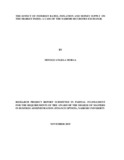| dc.description.abstract | The performance of a stock market of an economy is of interest to various parties including
investors, capital markets, the stock exchange and government among others as it provides an
avenue for raising funds, for trading in securities including futures, options and other derivatives
which provide opportunities for investors to generate returns (Peansupap &Walker,2005). The
relationship between the macroeconomic variables and the performance of the stock exchange
has been studied by most researchers both in the developed and developing countries and most of
the results have been contradicting.
The purpose of this study is to establish the effect of interest rates, inflation and money supply on
the market index represented by the NSE All Share Index, using a case study of the Nairobi
Securities Exchange. The objective of the research was to find out how changes in interest rates
(represented by 182 Day Treasury Bill in Kenya), Inflation (represented by the CPI), Money
Supply affect the Market Index (proxied by NSE All Share Index) over the period July 2010 –
June 2015. The secondary data was obtained from Central Bank of Kenya and the Nairobi
Secuties Exchange for the period July 2010 to June 2015. The quantitative data was analyzed
using quantitative approaches; correlation analysis and Ordinary Least Squares (OLS) method.
Pearson correlation analysis was used to determine the direction, strength, and significance of the
relationships between interest rates, money supply and inflation on the NSE All Share Index.
Ordinary Least Squares (OLS) method was aided by STATA software.
The findings confirmed that inflation, 182 day Treasury Bill, and money supply are significant
determinants of NSE All Share Index in Kenya. Specifically the results showed that increased
inflation and money supply increases the NSE All Share Index. The greatest effect is realized
from the money supply at 169 percent followed by inflation rate at 8.42 percent while the182
Day Treasury Bill was found to reduce NSE All Share Index by 11%.
In the light of the recent significant changes in the macroeconomic landscape such as increasing
inflation, interest rate and money supply that may cause shifts on the NSE All Share index over
time, making the function unstable it is necessary to investigate the NSE All Share Index in the
country using available annual data with some of these variables in consideration. As a result, it
is necessary to investigate the NSE All Share Index in the country using available daily, weekly
and annual data with some of these variables in consideration.
With reference to the above findings the research recommends that the macroeconomic variables
especially inflation and money supply need to be keenly monitored and appropriate measures
taken as they eventually have an impact on the stock market performance and the economy as a
whole. Further, the role of microeconomic variables factors on NSE All share index and other
macroeconomic variables such as GDP should be researched further. | en_US |

